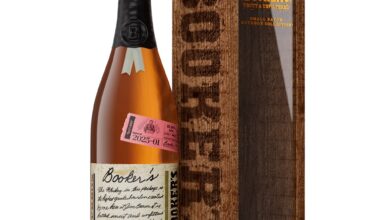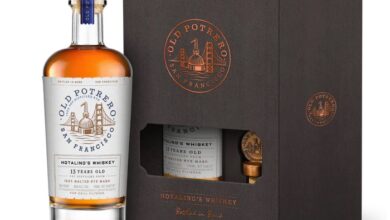How Long Will My Whiskey Last?
How To Extend The Shelf Life Of Opened And Unopened Bottles Of Whiskey
By Richard Thomas
High on my list of candidates for a FAQ at The Whiskey Reviewer is whether or not a bottle of whiskey can spoil, and if so how long it takes to do so. This question also appears regularly on whiskey internet forums.
The simple answer is “usually never.” Spirits have a high enough alcohol content that they are essentially a preservative in and of themselves, so they will never spoil in the sense that they rot, turn stale or otherwise become undrinkable.
However, I consciously chose that word “usually.” Whiskeys no longer continue to mature once bottled, but they can degrade. Whiskey collectors have three major enemies to guard against:
1. Air: Contact with the air will oxidize your whiskey, causing the breakdown of many of the chemical compounds that give it flavor. A new, unopened bottle of whiskey is little threatened by oxidation, because it’s stopper and wax/plastic/foil seal is intact and only a minute amount of air is trapped in the bottle. An opened bottle is a different story, however.
Air most frequently becomes a problem as you steadily drain the bottle of whiskey. This not only replaces whiskey with air in the bottle, but also increases the proportion of air to the fluid remaining. Even so, degradation of the whiskey is a slow process, and nothing like how beer or wine can go stale.

be fine for a year or more.
(Credit: John Rayls)
If you want to see how air exposure works in practice, leave a glass of whiskey you know well out in the open air for 24 hours, and give it a tasting. The difference will be obvious, especially if you try it side-by-side with a fresh pour.
The common rule is that once you have drained a 700 or 750 ml whiskey bottle down to half-full, you have roughly a year before the whiskey noticeably loses flavor, and perhaps as long as two years before loss of flavor becomes serious. If you have drained the bottle to 1/3 or less, the rate of degradation increases because of the greater proportion of air to whiskey, and you have roughly three months before you should notice flavor loss.
2. Light: Exposure to direct sunlight is a major storage no-no, because ultraviolet rays break down tannins in the whiskey. This is why so many whiskeys (and other forms of tannin-rich alcohol) are bottles in green, brown and black glass; the colored glass moderates light exposure.
3. Evaporation: Although less serious than air and light exposure, another enemy for the collector is loss of alcohol vapor. Part of the reason why distillation works in the first place is because alcohol has a lower boiling point than water, but that simple fact of chemistry also means alcohol evaporates more easily as well.
Heat increases the rate of evaporation, so keeping your whiskey in a cool place is an adequate to control evaporation. Certainly you should never store your whiskey in a stifling attic or above a heating vent or radiator.

Credit: Grant’s
What You Can Do
The best place to store your whiskey is inside a cabinet, in a cellar, or anywhere that you can keep things dark most of the time. Even so, it’s easy to overstate light exposure. Consider that a bottle of whiskey can sit on a liquor store shelf, exposed to some light but not direct sunlight, for years and suffer no noticeable degradation. This means you can put your collection on display, so long as it is never in direct sunlight and you actually intend to drink it in the near or middle term. Only whiskeys you intend to keep for the long term require storage in the dark.
Combating evaporation or air exposure starts by taking care of your stopper. Screw-caps and plastic stoppers should pose no difficulties, but contact with hard alcohol can destroy cork stoppers. Also, prolonged contact with the cork can impart unwanted flavors into the whiskey.
For these reasons, store your bottles standing up and keep an eye on the stopper whenever you open the bottle. A loose stopper will both increase air exposure and evaporation.
If your bottle has a bad cork stopper and/or is down to just a few drams and you want to horde those drams, the best solution is to transfer the whiskey to a new, smaller container. This allows you to both reduce the amount of air in the bottle and put the contents back under a proper seal again.




Thanks, good article. You covered off all the reasons for degradation, including corks! I’ve often thought that peaty whiskies lose their smokiness quite quickly, even within 6 months or so. I’ve also found that sulphured whiskies quickly get even worse with oxidation (though they’re flawed to start with). That’s subjective of course but I wouldn’t be surprised if others had found the same?
Jim Murray certainly agrees with you. He is a strong critic of sulfur.
I noticed on Sean Brock’s recent Instagram post that he uses wine bottle vacuum sealers on his opened Very Very Old Fitzgerald bottles from the 40’s. This seems like a great option to prevent oxidation.
It is! I tend to approach articles of this type from the point of view of “how can you do this without buying gear?”, but the wine enthusiast sector has developed some nice toys for extending the life of an open bottle that can do double duty.
What about keeping whisky in frigerator or at temperatures below 0°C? Does it spoil whisky?
Jimmy Russell at Wild Turkey used to keep his private stash of bourbon in the freezer.
I have (2) bottles of J & B Jet, that I purchased in the early 90’s. I put them, upright, in a dark basement storage room and then forgot about them. Well, I was cleaning out that room and came across them about 25 years later. Both came on those old vintage Rockers that let you display or pour. Your choice. One is still in the box that it came in. Neither have ever been opened.
I’m a Glenlivet guy now. I was kinda hoping that these (2) might taste better than when I bought em..
I guess there is only one way to find out. Even though they look cool, if the juice is bad, they might still look good on the bar, secretly filled with Glen 15..
What about wild turkey decanters if they stay sealed
Thanks for also talking about how flavored whiskey should be stored. I’m interested in looking for a good kind of whiskey to buy because I’m thinking about stocking up on alcohol at home. I think that will make it easier to make pairings whenever I happen to have a steak dinner.